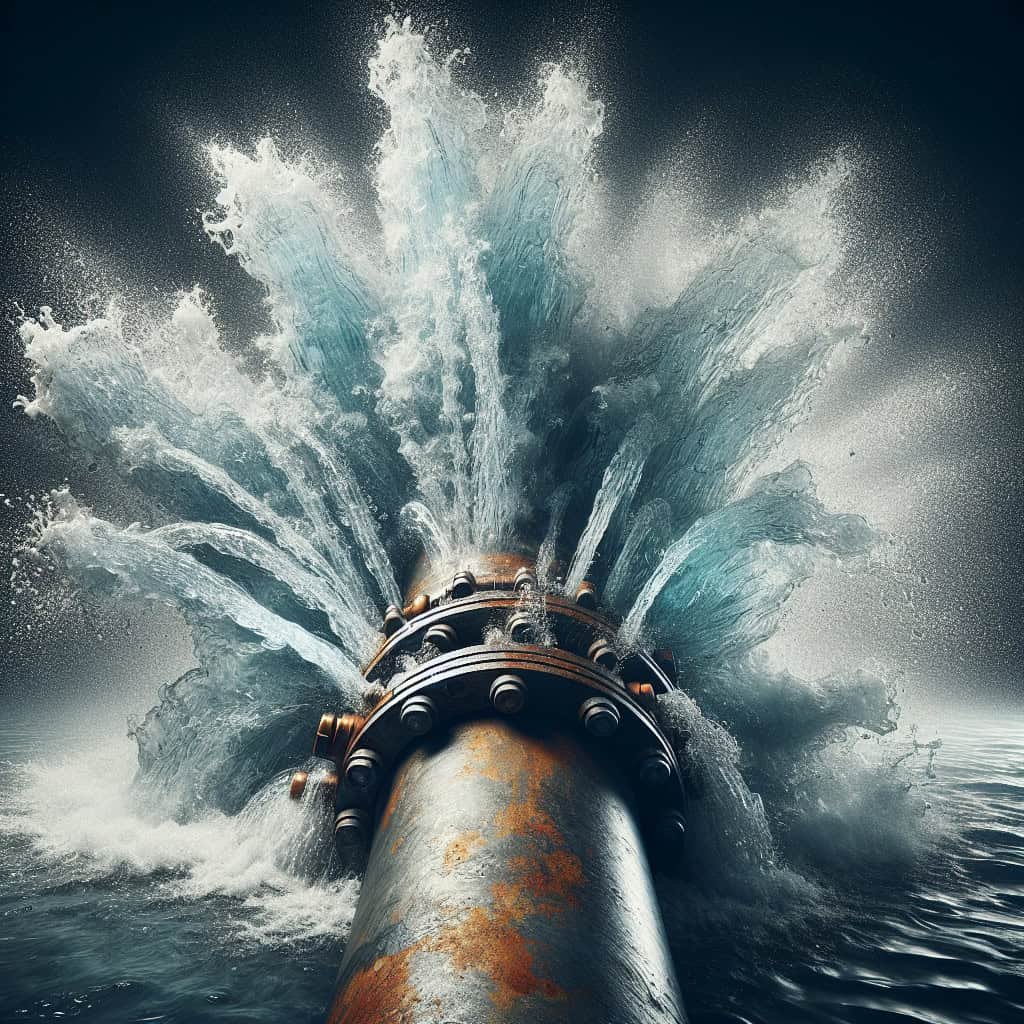So you’ve got a well on your property and you rely on its water supply for your household needs. That’s great! However, it’s important to be aware of the safety issues that can arise from the regulation of well water pressure. In this article, we’ll explore the potential dangers and precautions you should take to ensure the safety of your well water system. Whether you’re a first-time well owner or have been using well water for years, this information will help you navigate the waters of well water pressure regulation in a safe and efficient manner.
Potential health risks
Bacterial contamination
When it comes to well water, one of the potential health risks associated with poor pressure regulation is bacterial contamination. If the water pressure is too high, it can cause damage to the plumbing system, leading to leaks and cracks. These openings create an opportunity for bacteria to enter the system and contaminate the water supply. This can pose serious health risks to you and your family, as bacteria such as E.coli and coliforms can cause gastrointestinal illnesses and other diseases. By regulating the water pressure, you can reduce the likelihood of bacterial contamination and protect your health.
Chemical contamination
In addition to bacterial contamination, poor water pressure regulation can also lead to chemical contamination. When the pressure is too high, it puts stress on the plumbing fittings and pipes, which can cause them to deteriorate or even break. This can result in the release of harmful chemicals, such as lead or copper, into your water supply. These chemicals can have detrimental effects on your health, especially if ingested over a long period of time. By ensuring proper pressure regulation, you can prevent the risk of chemical contamination and ensure the safety of your water.
Common causes of high pressure
Well pump malfunction
One of the common causes of high water pressure is a malfunctioning well pump. If your well pump is not functioning properly, it may continuously pump water into your plumbing system, causing the pressure to rise excessively. This can put a strain on your pipes, fixtures, and appliances, increasing the risk of damage and potential health hazards. It is important to regularly inspect and maintain your well pump to ensure it is functioning correctly and not causing high water pressure.
Closed system
Another cause of high water pressure is a closed system. In a closed system, water is unable to flow freely, leading to an increase in pressure. This can occur when valves are closed or partially closed, limiting the water’s ability to escape. If you have noticed an increase in water pressure, check all the valves in your system to ensure they are fully open. By allowing water to flow freely, you can prevent the build-up of pressure and reduce the risk of damage to your plumbing system.
Pressure tank issues
Issues with the pressure tank can also contribute to high water pressure. A pressure tank is responsible for maintaining the correct water pressure in your plumbing system. If the tank is too small or malfunctioning, it may not be able to regulate the pressure effectively, causing it to increase. This can lead to several problems, including damage to your plumbing fixtures, increased water bills, and the risk of leakage and burst pipes. Regular inspection and maintenance of your pressure tank can help identify and address any issues before they escalate.

Risks of high water pressure
Damage to plumbing fixtures
High water pressure can cause significant damage to your plumbing fixtures. Excessive pressure puts strain on the pipes, joints, and fittings, causing them to weaken over time. This can result in leaks, cracks, and even burst pipes. Additionally, the constant force of high-pressure water can erode fixtures, such as faucets and showerheads, leading to their premature failure. By regulating the water pressure, you can protect your plumbing fixtures from damage and avoid costly repairs or replacements.
Increase in water bills
Another risk of high water pressure is an increase in water bills. When the pressure in your plumbing system is too high, it causes water to flow at a faster rate than necessary. This not only wastes water but also increases your water consumption, resulting in higher water bills. By maintaining the correct pressure, you can ensure efficient water usage and keep your utility costs under control.
Leakage and burst pipes
Perhaps one of the most serious risks associated with high water pressure is the potential for leakage and burst pipes. The excessive force of water can lead to weak spots in the pipes, causing them to develop leaks or even burst open. This not only leads to water damage in your home but also poses a safety hazard. Burst pipes can release a large volume of water and cause flooding, which can lead to structural damage, mold growth, and potential electrical issues. Proper pressure regulation is crucial in preventing these risks and maintaining the integrity of your plumbing system.
Importance of pressure regulation
Preventing plumbing damage
One of the main reasons why pressure regulation is important is to prevent plumbing damage. High water pressure can put immense strain on your pipes, fittings, and fixtures, causing them to weaken, leak, or even break. By maintaining the correct pressure, you can prolong the lifespan of your plumbing system and avoid costly repairs.
Protecting appliances and fixtures
Proper pressure regulation also helps protect your appliances and fixtures. Many household appliances, such as washing machines, dishwashers, and water heaters, are designed to operate within specific pressure ranges. When the water pressure exceeds these limits, it can cause damage to the appliances and shorten their lifespans. Similarly, fixtures such as faucets, showerheads, and toilets can be damaged by high water pressure. By regulating the pressure, you can safeguard your appliances and fixtures, ensuring they function optimally and last longer.
Avoiding water wastage
In addition to the potential damage to your plumbing system and appliances, high water pressure also leads to water wastage. When the pressure is too high, water flows at a faster rate, resulting in inefficient use. This not only wastes a precious resource but also increases your water bills. By regulating the pressure, you can ensure that water is used efficiently, minimizing waste and reducing your environmental impact.

Pressure regulation devices
Pressure reducing valves (PRVs)
Pressure reducing valves, also known as PRVs, are commonly used devices to regulate water pressure. These valves are installed in the main water line and work by reducing the incoming pressure to a safe and desired level. They automatically adjust the flow of water, ensuring that it remains within the recommended range. PRVs are available in different sizes and pressure ranges, allowing you to choose the one that best suits your needs. These devices are highly effective in maintaining the proper water pressure throughout your plumbing system.
Pressure tanks
Pressure tanks are another essential component in pressure regulation. These tanks store a certain amount of water under pressure, which helps in maintaining a constant water pressure throughout the system. When the pressure drops below a certain level, the tank releases water to restore the pressure and ensure a consistent flow. Pressure tanks are especially useful in well systems, where they provide additional water pressure and help prevent the pump from constantly cycling on and off.
Pressure relief valves
Pressure relief valves are safety devices designed to protect your plumbing system from excessive pressure. These valves are typically installed at strategic points within the system and are designed to open and release water when the pressure rises above a certain level. This prevents the buildup of pressure and helps protect your pipes, fixtures, and appliances from damage. Pressure relief valves are essential in maintaining a safe and balanced pressure in your plumbing system.
Maintenance and troubleshooting
Regular inspection and testing
Regular inspection and testing are vital in maintaining proper pressure regulation and ensuring the overall health of your plumbing system. It is recommended to have a professional plumber inspect your system at least once a year to check for any issues or potential risks. During the inspection, they can test the water pressure and inspect the pressure regulating devices to ensure they are functioning correctly. Identifying and addressing any problems early on can prevent more significant issues down the line and save you from costly repairs.
Checking pressure settings
Along with regular inspections, it is important to periodically check and adjust the pressure settings on your pressure regulating devices. Over time, these settings may need to be modified to accommodate changes in water usage or any other system alterations. It is best to consult the manufacturer’s instructions or seek professional advice to ensure that you are setting the pressure correctly and within the recommended range.
Addressing leaks and drips
Leaks and drips are signs of potential pressure regulation issues in your plumbing system. If you notice any leaks or drips, no matter how small, it is important to address them promptly. Leaks can lead to a decrease in water pressure or an increase in pressure, depending on the location and severity. A professional plumber can help identify the source of the leaks and repair them to maintain proper pressure regulation.

Professional assistance
Hiring a licensed plumber
While regular maintenance and troubleshooting can help in ensuring proper pressure regulation, it is also important to seek professional assistance when needed. Hiring a licensed plumber who specializes in pressure regulation can provide you with expert advice and services. They have the knowledge, skills, and experience to diagnose and resolve any pressure-related issues in your plumbing system. A licensed plumber can also recommend the best pressure regulation devices and ensure they are installed correctly to optimize their performance.
Consulting water quality experts
In addition to hiring a plumber, it can also be beneficial to consult water quality experts. These professionals specialize in analyzing the quality of your water and can provide insights regarding any potential contaminants or other water-related issues. They can conduct tests to determine if any chemical or bacterial contamination is present and offer recommendations on how to address these concerns. Consulting water quality experts can provide you with the peace of mind that your water is safe and properly regulated.
Testing water quality
Laboratory analysis
To ensure the safety of your well water, it is advisable to conduct laboratory analysis on a regular basis. This involves sending a water sample to a certified laboratory for thorough testing. The laboratory will analyze the water for various contaminants, such as bacteria, nitrates, lead, and other harmful substances. The results of the analysis will give you a comprehensive understanding of the quality of your water and help identify any potential risks or issues that need to be addressed.
Water testing kits
If you prefer a more convenient and less expensive option, you can also use water testing kits. These kits are readily available and allow you to test your water at home. They typically come with detailed instructions on how to collect a water sample and perform the tests. While not as comprehensive as laboratory analysis, water testing kits can provide you with a good indication of the water quality and alert you to any potential problems.

Potential remedies for low pressure
Well pump repairs
If you are experiencing low water pressure in your well system, one of the potential remedies is to have your well pump repaired. Low pressure can be a sign of a faulty well pump, which may need to be repaired or replaced. A professional plumber can inspect your pump and determine the best course of action to restore proper pressure.
Pressure tank issues
Issues with the pressure tank can also cause low water pressure. If the tank is malfunctioning or has a low charge, it may be unable to maintain the necessary pressure throughout your plumbing system. In such cases, a professional can inspect and repair the pressure tank or recommend a replacement if needed.
Pipe and well cleaning
Low water pressure can also be caused by clogged or dirty pipes and well screens. Over time, mineral deposits, sediments, or debris can accumulate in your plumbing system, restricting the flow of water. Having your pipes and well screens cleaned can help remove these obstructions and restore proper water pressure.
Conclusion
Proper pressure regulation is essential for maintaining the integrity of your well water system and protecting your health. By understanding the potential health risks associated with poor pressure regulation, common causes of high pressure, and the importance of pressure regulation, you can take proactive steps to ensure the safety and efficiency of your plumbing system. Regular maintenance, professional assistance, and water quality testing are crucial in addressing any pressure-related issues and maintaining the proper functioning of your well water system. Remember to consult with experienced professionals and prioritize regular inspections to keep your water pressure regulated and your well water safe.

